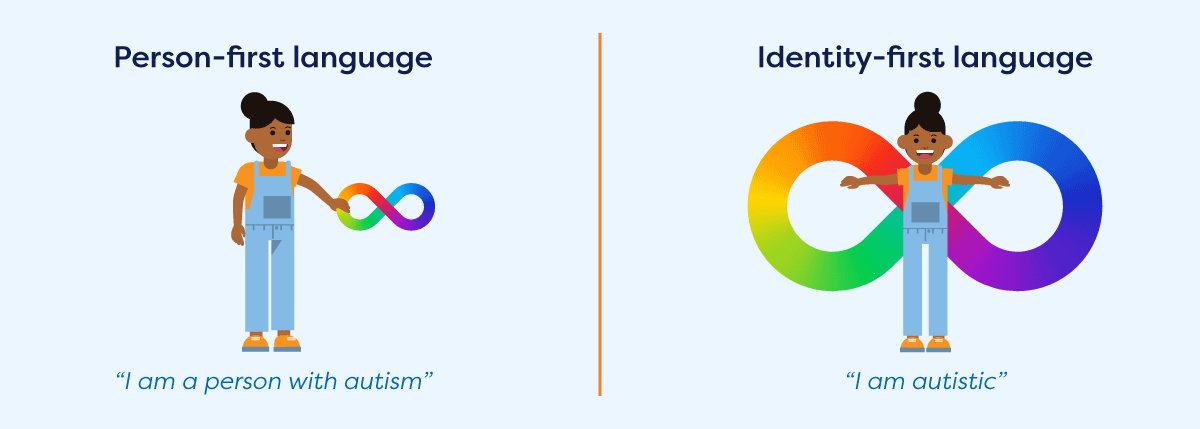April Newsletter | Celebrating Autism Acceptance Month

Lea este artículo en español aquí.
Celebrating Autism Acceptance Month
In celebration of Autism Acceptance Month this April, we’re reflecting on language and advocacy for individuals who identify as autistic. How we think and speak about autism, disability, and identity has changed considerably since the first National Autistic Children’s Week in April of 1972. Being thoughtful about language, prioritizing acceptance, and encouraging self-advocacy are great ways to celebrate Autism Acceptance Month!
Words Are Powerful
The language we use has the power to shape the world around us, including our relationships with one another. When we use our vocabulary to describe ourselves and others, we make important choices that carry meaning beyond the words themselves. While there is no single correct vocabulary surrounding autism, two philosophies tend to be most used:
- Person-first language: Person-first language emphasizes that we are all people, regardless of disability or other aspects of our identity. Common phrases that align with the person-first philosophy include, “I am a person with autism” or “I am a person who has autism.” The key here is that autism, or any other characteristic, is secondary to the person themselves.
- Identify-first language: Identity-first language embodies the idea that autism and disability are integral to a person’s very identity; it suggests that oneself and one’s disability cannot be separated. Common phrases that align with identify-first language include, “I am autistic” or “I am an autistic person.”

No two people identify the same way, and it’s important to acknowledge and respect each person’s preferred vocabulary. Consider these questions as you’re practicing thoughtful approaches to language:
- How does this person identify? What language do they use to describe themselves?
- Have I asked what this person prefers? Do they have a preference?
- If I were in their shoes, what would I prefer? Does that align with their preferences?
Autism Acceptance and Awareness
Autism Acceptance and Autism Awareness have different histories and implications. Since 2011 and 2021, respectively, the Autistic Self Advocacy Network and the Autism Society have advocated for Autism Acceptance, saying, “Acceptance of autism as a natural condition in the human experience is necessary for real dialogue to occur.” Autism Acceptance Month advocates for an inclusive approach to the autism community. Education and awareness are milestones along the way toward a greater goal—we aim for understanding, respect, and celebration of the neurodiverse people in our communities worldwide. To help introduce students to Autism Acceptance Month, check out our “Autism Acceptance Month” discussion story (English | Español). To spark more conversation about awareness and acceptance of disabilities, use the “National Developmental Disabilities Awareness Month” discussion story from our March Academic Teaching Unit. The story (English | Español) is available in two versions to meet a wide range of learner needs and abilities.
Empowering Students
Self-advocacy begins with reflection and mindfulness. Help students to start thinking about strengths, differences, and what makes each person unique, with this “All About Me" activity (English | Español). Depending on your students’ learning needs, choose between a picture-based or written worksheet, and share completed worksheets with parents and caregivers to keep the conversation going at home. Understanding and communicating about one's identity, strengths, and preferences can open the door to meaningful exchanges around disability, awareness of self and others, and celebrating and promoting the autistic community. Check out the Autism Self Advocacy Network's digital book on autism acceptance for more ways to celebrate and advocate!
Ethical Practices in Applied Behavior Analysis (ABA)
Applied Behavior Analysis (ABA) is an umbrella term describing various evidence-based strategies used to understand behavior and teach new skills. While the principles of ABA are an effective way to teach many individuals with autism, there are varying perspectives on how helpful or harmful these strategies can be. When practiced with a high standard for ethics and an understanding of the perspectives of the autistic community, ABA can result in positive, socially significant changes for the learner. Ethical practices include:
- Recognizing that experiences with ABA vary greatly
- Listening to and understanding different perspectives around ABA, including those from the autism community
- Promoting autonomy and self-advocacy skills
- Avoiding methods that cause harm or change behaviors that are core to a student’s identity, agency, and self-expression
- Involving the learner in goal determination and decision-making
- Using strengths-based approaches and incorporating student interests
- Prioritizing communication skills and social opportunities
- Collaborating with caregivers to establish culturally relevant goals that honor their child’s unique strengths and needs
- Embracing neurodiversity as a societal strength and advocating for acceptance and inclusion of autistic individuals
